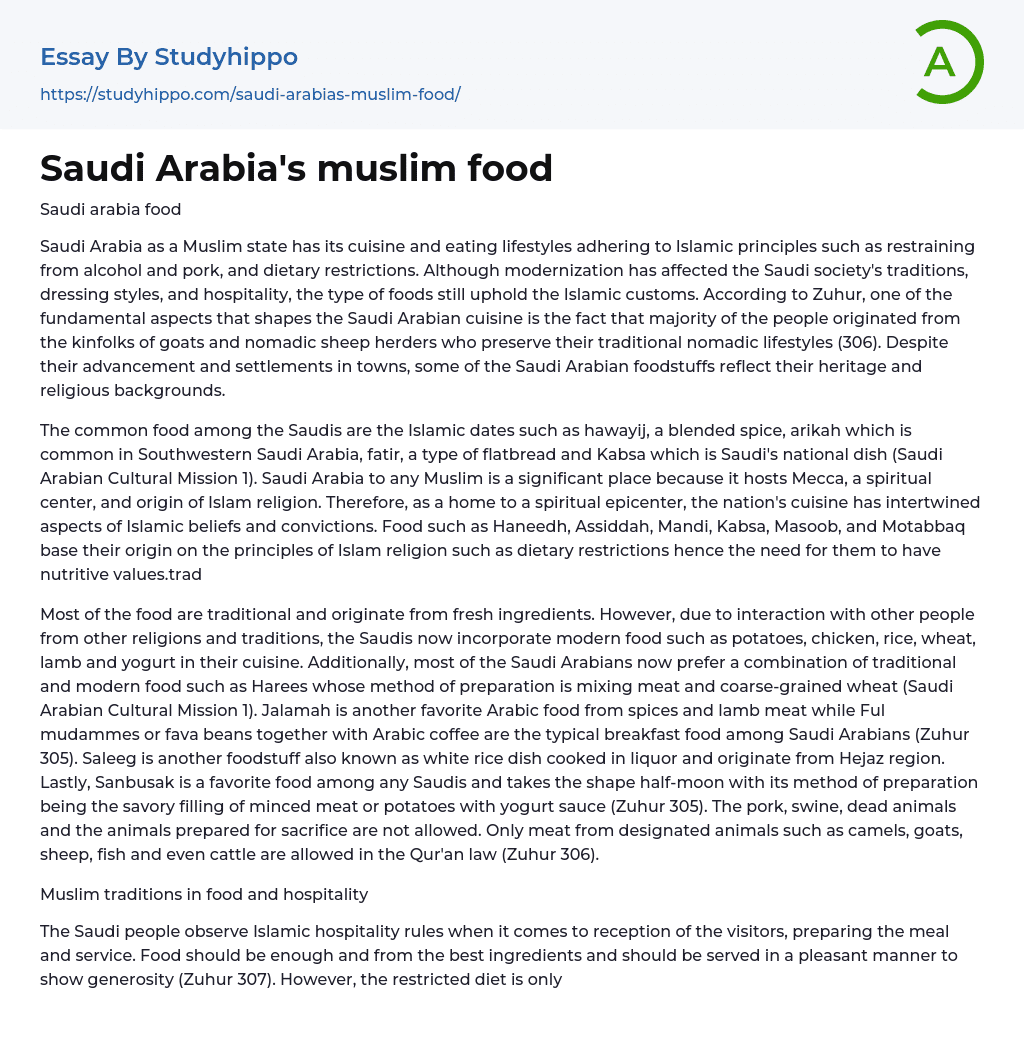Saudi Arabia Food
Saudi Arabia, a Muslim state, follows Islamic principles in its cuisine and eating habits, which include avoiding alcohol and pork. The traditional foods in Saudi Arabia continue to adhere to Islamic customs despite the influence of modernization on the society's traditions, clothing styles, and hospitality. Zuhur explains that the Saudi Arabian cuisine is influenced by the fact that many people in the country have ancestral ties to goat and sheep herders who maintain traditional nomadic lifestyles (306). Even as Saudi society has become more urbanized, certain food items still reflect their heritage and religious backgrounds.
The Saudis have a common food culture that includes Islamic dates like hawayij and arikah, a spice blend and flatbread respectively (Saudi Arabian Cultural Mission 1). Saudi Arabia holds great significance for Muslims as it is home to Mecca, a spiritual cen
...ter and the birthplace of Islam. As a result, the country's cuisine reflects the Islamic beliefs and convictions that are intertwined with their food. Traditional dishes like Haneedh, Assiddah, Mandi, Kabsa, Masoob, and Motabbaq are rooted in Islamic principles such as dietary restrictions, thus ensuring nutritional value. These dishes mainly rely on fresh ingredients. However, the Saudi food culture has evolved due to interactions with people from different religions and traditions, leading to the inclusion of modern ingredients like potatoes, chicken, rice, wheat, lamb, and yogurt in their cuisine.
Most Saudi Arabians now prefer a combination of traditional and modern food. Harees, for example, is prepared by mixing meat and coarse-grained wheat. Jalamah is another popular Arabic dish made from spices and lamb meat. Ful mudammes, or fava beans, are typically enjoyed with Arabic coffee for breakfast. Saleeg,
also known as a white rice dish cooked in liquor, originates from the Hejaz region. Another beloved Saudi Arabian food is Sanbusak, which takes the shape of a half-moon and is filled with minced meat or potatoes and served with yogurt sauce. According to the Qur'an law, the consumption of pork, swine, dead animals, and animals prepared for sacrifice is prohibited. Only meat from designated animals, including camels, goats, sheep, fish, and cattle, are permitted (Saudi Arabian Cultural Mission 1; Zuhur 305-306).
Muslim traditions in food and hospitality
The Saudi people follow Islamic hospitality customs for receiving guests, preparing meals, and serving. It is important that food is plentiful, made from high-quality ingredients, and presented in a generous manner to display generosity (Zuhur 307). However, the dietary restrictions only apply to foods that are considered religiously prohibited in the Qur'an. Table and mealtime etiquette in Saudi Arabia are influenced by both Islamic traditions and nomadic heritage. For example, it is customary to eat with the right hand as Islamic law considers the left hand to be unclean since it is typically used for personal hygiene purposes.
Saudi Arabians have a customary practice of hand washing before and after mealtime. The consumption of spiritual and traditional food by Saudi Arabian nationals is still done in accordance with Islamic eating lifestyles and dietary practices. While there have been some changes in cooking methods due to modernization and shifts in lifestyles, Saudi Arabian food and nutrition continue to showcase their religious customs as dictated by the laws in the Qur'an.
Works Cited
- Saudi Arabian Cultural Mission. History of Food in Saudi Arabia.
Saudi: Saudi Arabian Cultural Mission (SACM), 2013. Print.
Print.
- Food Safety essays
- Food Security essays
- Beverages essays
- Cuisines essays
- Dairy essays
- Desserts essays
- Fast Food essays
- Bread essays
- Meal essays
- Meat essays
- Organic Food essays
- Rice essays
- Sugar essays
- Taste essays
- Beef essays
- Coconut essays
- Crowd essays
- Dinner essays
- Juice essays
- Sainsbury essays
- Cooking essays
- Ginger essays
- Oreo essays
- Drink essays
- Beer essays
- Wine essays
- Coffee essays
- Tea essays
- Cake essays
- Hamburger essays
- Ice Cream essays
- Burger essays
- Pizza essays
- Fruit essays
- Lemon essays
- Food Waste essays
- Favorite Food essays
- Alcoholic essays
- Soft Drinks essays
- Cookie essays
- Starch essays
- Yeast essays
- Cola essays
- Pizza Hut essays
- snack foods essays
- chips essays
- Biscuit essays
- Brewing essays
- Brewery essays
- Anorexia essays




